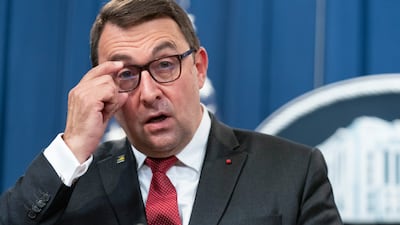Europe’s energy crisis is one of several factors that could increase radicalisation on the continent, deputy executive director of Europol operations Lt Gen Jean-Philippe Lecouffe warned on Tuesday, amid growing calls for increased international co-operation on counter-terrorism.
“We must be careful,” Lt Gen Lecouffe told The National on the margins of a conference on radicalisation and extremism at the European Parliament in Brussels.
“There will probably be people who will be left helpless by the situation. That’s a possible breeding ground for recruitment,” he added, citing the economic crisis in Europe and climate change as other potential drivers of radicalisation.
European energy ministers are struggling to agree on measures to bring down electricity bills that have soared following Russia’s invasion of Ukraine earlier this year.
Inflation across Europe neared 11 per cent in September and political leaders fear social unrest this winter if households cannot be heated properly and if businesses are forced to shut.
Speaking earlier on Tuesday to an audience that included ambassadors to the European Union from the Middle East, North Africa and South Asia, Lt Gen Lecouffe called on all countries willing to co-operate with the institution to come forward.
“Europol welcomes any partnership with any country and any information that can be useful to reinforce the security of EU citizens but also of citizens of the world travelling to Europe,” he said.
Some ambassadors demanded increased co-operation on counter-terrorism issues from the EU.
“Terrorism cannot be addressed in isolation. You need to have international co-operation,” said Sri Lanka’s ambassador to Belgium and the EU Grace Asirwatham.
She said that international support for her country following the 2019 Sri Lanka Easter bombings that killed 269 people had been minimal.
“With the EU, we have political economic and development relations but counter-terrorism-related relations [are] lacking. We don’t get substantive co-operation.”
Organised by Czech MEP Tomas Zdechovsky, Tuesday’s conference on radicalisation and extremism brought into sharp focus how groups close to the Muslim Brotherhood had received funding from EU institutions.
“You’d think they’re outcast but they’re not,” said Lorenzo Vidino, director of the programme on extremism at George Washington University. He pointed to events organised by groups with close ties to the Muslim Brotherhood that were held in the same European Parliament conference room as Tuesday’s event.
But the EU also needs to work on preventing flows from outside Europe from reaching such groups that “slip under our radar”, said Natasha Bertaud, deputy head of Cabinet for EU Commission Vice President Margaritis Schinas.
“We need to also have a more ample understanding in the commission and institutions but also in member states about how these organisations that challenge EU values are operating,” she said.
The EU only has one mechanism to screen foreign investments which was set up in 2019.
“I think more needs to be done to look at the values at stake, and not just at the strategic aspects of those investments,” said Ms Bertaud.


